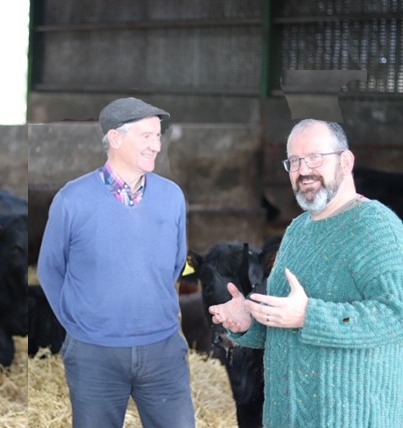From being Scotland’s ‘little known fourth language’ to reaching a global audience, Doric TV is helping cement Doric’s place firmly on the map.
Initially, The Doric Future website was created by Jill McWilliam and Gordon MacKay of Cruden Bay, Aberdeenshire to ensure future generations would benefit from ‘seeing and hearing’ the Doric language and culture as it is today. It serves as a place where people from the Buchan area and all over Aberdeenshire can come to enjoy the very best of living in this part of the world. Jill began to create videos during the 2020 lockdown after recognising that whilst stations existed for Gaelic speakers, there was nothing out there for Doric speakers, the Doric TV domain was then created.
The Doric future domains include a website, YouTube channel, and Facebook page dedicated to showcasing the history, culture, and language of the North East. The platform has helped to create a unique celebration of Aberdeenshire and of the people who live here. Jill has made over 200 videos, and these have been watched by many globally, even reaching as far as Australia, New Zealand, Canada, and the United States.
Although a native of the Buchan area, Jill began her journey of videoing whilst living and working in Inverness for a 10-year span. She did an extensive amount of voluntary work with the elderly and wanted to capture on film the people she fondly got to know before she moved back to Aberdeenshire. On return, Jill has continued to use her filming skills to get through the many challenging times she has faced. Over a period of 20 years, she suffered a bipolar condition, an enduring mental health condition that adversely affected her whole life. She latterly worked as a pupil support assistant in a local school which she gave up to spend time with her partner who had been diagnosed with a myeloma cancer of the blood.
Since establishing the platform, Jill has gone on to achieve many notable milestones, including a nomination for the ‘Business Woman Scotland of the Year Award 2020’ for Social Impact. A highlight for Jill came at the end of March 2021, when she was interviewed by ABC Australia radio.
Despite its humble beginnings as a method of capturing and preserving the language, Doric TV now hopes to work alongside the Elphinstone Institute at the University of Aberdeen to archive over 120 videos for future generations.
Current activity
With Jill’s contemporary approach to what Aberdeenshire is today, she started to gather a Doric Team to present views on why the Doric culture and language is so important. She knew many individuals working in various creative fields, presenting their unique take on The Doric and brought them together in one platform. The first Doric Team held their first meeting over zoom at the beginning of April, which can now be watched online. The team shared their passionate thoughts on all things Doric, including poetry and music. A highly passionate group emerged, consisting of individuals from all over Aberdeenshire boasting a wide variety of talents, all connected together by a love for Doric culture.

The initial meeting sought to introduce members by asking the simple question; ‘what does Doric mean to you?’ As each member explained their feelings towards their native culture through passage and song, many laughs and discussions were shared. The initial meeting sought to introduce members by asking the simple question; ‘what does Doric mean to you?’
Mark Findlater, councillor for Banff and Buchan, said, “The stories, poems and language are our heritage and make us who we are today and with our help, will continue to do so for future generations.”


Alan Reid, a musician from Fraserburgh, said, “Doric is in oor DNA, vocalising the soul and entwining it inti oor lands, fae mountain ti sea. Its i language that gies yi a wee bit mare than descriptive words and allows yi ti paint a rich tapestry using fewer strokes.”
Bea Jefferson from Foundation Scotland said, “The language and voices of the north east are as much part of its special character as the landscape – and one to be valued and maintained.”
Together with two journalism students from the Robert Gordon University, Ellie McDonald and Ewan Blacklaw, as part of a 4-week placement. The students assisted Jill and it is hoped they will continue to develop new content for Doric Future to share to a wider audience.

Tune into Doric TV now on www.dorictv.co.uk where you can actively become a member of the Doric TV community or follow them on Facebook. Jill’s entire collection of videos can be viewed in the Doric Future you tube channel and the Doric Future website www.doricfuture.co.uk


Recent Comments